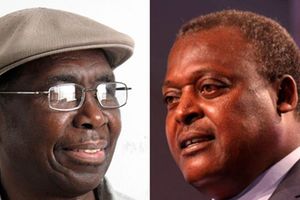Premium
UN mission links DR Congo massacres to interethnic violence

Soldiers of the United Nations mission in Democratic Republic of Congo (Monusco).
What you need to know:
- The Ituri region has been riven in recent years not only by the rebel violence but by the conflict between two ethnic groups, the Lendu, mainly farmers, and the Hema, herders and traders, in the gold-mining and oil-rich province.
- A brigade from United Nations Organisation Stabilisation Mission in the DR Congo (Monusco) was sent to the scene on Thursday along with Congolese troops.
- Gidi said on Friday that "the figures don't matter. What must be understood is that massacres have taken place.
Intercommunal violence was probably the cause of two massacres in the Democratic Republic of Congo's northeast this week, a UN peacekeeping source said Friday, while unable to confirm the toll of 58 deaths given by local officials.
The Ituri province's interior minister Adjio Gidi said on Thursday that 23 people were killed in the region on Tuesday, and another 35 on Thursday.
Gidi blamed the Allied Democratic Forces (ADF) Muslim rebel group for the killings.
"We haven't got confirmation of the toll figures," the UN source said.
But he steered away from blaming the Muslim rebels.
"It doesn't appear to be the ADF," he said. "It seems that these are intercommunal conflicts."
The Ituri region has been riven in recent years not only by the rebel violence but by the conflict between two ethnic groups, the Lendu, mainly farmers, and the Hema, herders and traders, in the gold-mining and oil-rich province.
A brigade from United Nations Organisation Stabilisation Mission in the DR Congo (Monusco) was sent to the scene on Thursday along with Congolese troops.
Gidi said on Friday that "the figures don't matter. What must be understood is that massacres have taken place."
"People have been killed and people have been displaced," he added.
"We presume that this was the work of the ADF, because they are very active in the area," Gidi explained.
The ADF originated in the 1990s as a Ugandan Muslim rebel group and has been accused of killing hundreds of civilians since DR Congo's armed forces launched a crackdown against them last November.





